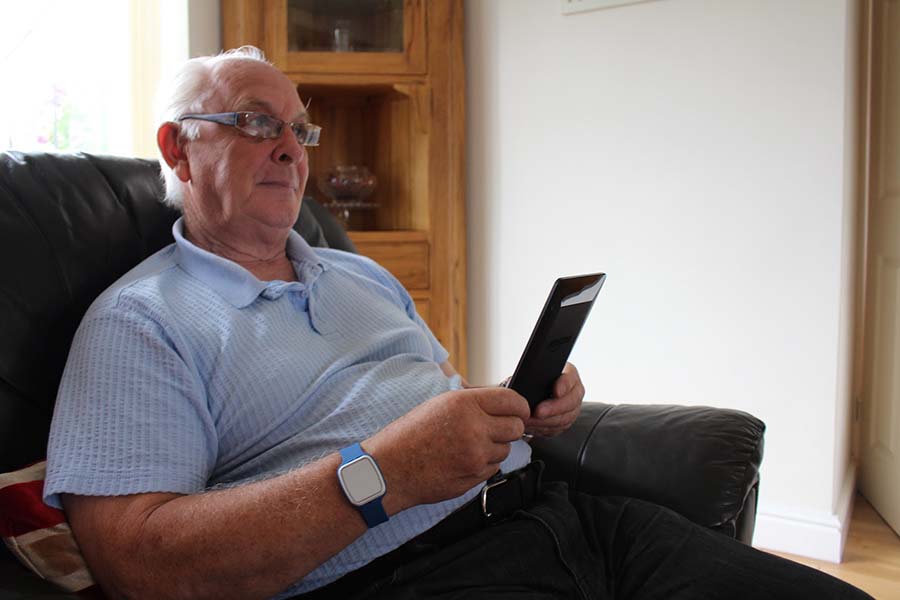Guest article: The socio-economic benefits of assistive technology and why we must invest

The coronavirus pandemic has had an everlasting impact on health and social care services, accelerating a technological transformation that was slowly underway prior to the outbreak.
With the landscape unrecognisable to what it was just seven months ago, health and social care leaders have been forced to rapidly embrace and adopt new innovations and ways of working to keep pace with the demands of delivering care during a global pandemic.
Now, as society starts to look to the future, Gavin Bashar, UK Managing Director of Tunstall Healthcare, discusses why leaders in the sector must understand how to take advantage of the new opportunities around assistive technology highlighted during the crisis, alongside the socio-economic benefits and the importance of investing.
By Gavin Bashar
Assistive technology during COVID-19
The COVID-19 crisis has led to a huge increase of attention and focus on the capabilities and benefits technology enabled care (TEC) welds to both address and support current and future health and care challenges. Service providers are also beginning to recognise that telecare and telehealth can offer significant benefits through wider and more effective deployment, as well as more advanced proactive approaches.
The ability of technology to provide 24-hour support and an emergency response if required is crucial, and the global health crisis has led to its capability to assist in a personalised approach being more widely understood. Many service providers have invested in TEC to move towards a more person-centred and remote style of care delivery as a result of COVID-19.
The socio-economic benefits
When deployed effectively, TEC has a significant number of socio-economic benefits. It can be used by service providers to support vulnerable people to stay independently in their own home for longer, reduce the need for more complex care and interventions, and improve service user satisfaction and the wellbeing of users and their families.

During the pandemic, remote health monitoring through technology enabled care has given carers and industry leaders the opportunity to successfully continue providing high quality care, while simultaneously working to prevent the spread of the virus and limiting the number of deaths.
When health and social care systems are integrated, and TEC is embedded into our services it is possible to look at data from multiple sources and adapt care delivery over time. Intelligent systems can provide both predictive and preventative measures when assessing risks and mitigating circumstances, to improve and sustain desirable health outcomes. As more health and social care leaders understand the socio-economic benefits and invest in TEC, intelligent health and social care solutions can be increasingly delivered to empower individuals, families and carers, and ensure people have the right level of care and support to live safely and independently.
TEC in practice during COVID
Cornwall Partnership NHS Foundation Trust has adopted assistive technology to support young people with eating disorders during the COVID-19 crisis.
The Trust provides both physical and mental health services to children and adults. It uses technology from Tunstall Healthcare to coordinate its Digital Health Service and offer treatment and support to children over the age of 11 with a range of eating disorders, including Anorexia Nervosa, Bulimia Nervosa and Restrictive Eating Disorder.
Remote health monitoring software was introduced to enable clinicians to support patients in their own home throughout the pandemic. Patients used the myMobile™ app and ICP ‘triagemanager®’ software to take weekly readings of their vital signs including blood pressure, temperature and weight, alongside answering a range of symptom-related questions.
Although still in its infancy, the 32 existing caseload patients deemed to be at high risk have already been referred, and feedback from the clinicians involved has been extremely positive. The outcomes are currently still being measured, however it’s expected that hospital admissions will be reduced, early intervention will increase, self-management will improve and patients will benefit from better health and wellbeing.
For more information about the COVID-19 initiatives developed by Tunstall Healthcare and how technology can support health and social care provision, please visit www.tunstall.co.uk

